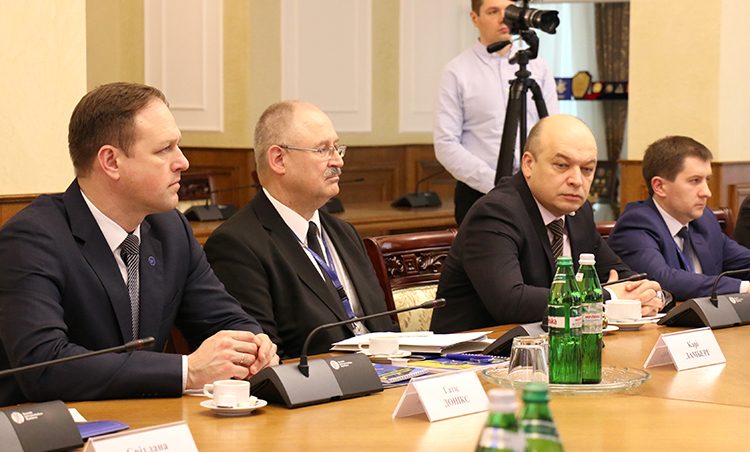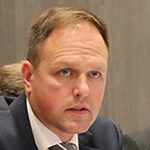Performance Evaluation: ‘A fair justice system involves objective ways to measure performance of prosecutors’
October 05, 2017
The EU Advisory Mission Ukraine (EUAM) is supporting Ukraine develop a new performance evaluation system for prosecutors. The Mission has set up working groups with regional prosecution services in Lviv, Kharkiv and Odesa to take this forward and has also financed study trips to Latvia (24-28 April 2017) and to France (18-22 September 2017) for senior prosecutors so they could find out more about the system used in EU countries.
 Gatis Doniks |
 Svitlana Oliinyk |
Gatis Doniks, EUAM Senior Adviser on Prosecution and Svitlana Oliinyk, EUAM Prosecutorial Reform Officer, explain why the creation of a performance evaluation system for public prosecutors in Ukraine is so important.
How would you evaluate Ukraine’s current performance evaluation system for public prosecutors?
Gatis: Currently, there is no performance evaluation system for public prosecutors in Ukraine. When the new law on prosecution came into force in mid-July 2015, it did not include any provisions on this matter. Previously, there were quantitative indicators to evaluate prosecutors, mainly the number of cases taken to court. An effective performance evaluation system measures qualitative performance however, as well as quantitative data.
Some cases are more complicated than others and an evaluation system therefore needs to reflect this. We are working towards creating such a system. Creating a fair prosecution system that people trust will involve creating fair indicators for measuring the performance of prosecutors.
Svitlana: Our goal is to create a performance evaluation system that changes the prosecution service for the better, with objective and transparent criteria to ensure that career advancement is fair. We also hope that clearly defined performance evaluation criteria will act as a safeguard for prosecutorial autonomy.
What are the elements of an effective performance evaluation system?
Gatis: Every country has its own system, but the Venice Commission opined in 2010 that the emphasis should be on qualitative indicators and not only statistics. Qualitative indicators can include the quality of procedural decisions and instructions given to investigators in cases, teamwork and the ability to cooperate with other law-enforcement agencies and decision-making ability.
Svitlana: It is also important that prosecutors should have the right to appeal final decisions while going through the performance evaluation process as well as the right to provide self-evaluation reports of their performance for appraisal.
How often should evaluations take place?
Gatis: The quality of the evaluations is more important than their frequency. If done correctly, an evaluation process is a time consuming exercise, which requires a lot of resources. In Latvia, they take place every five years. In Finland, on the other hand, they are every year and in France prosecutors are evaluated every two years. Our recommendation would be for Ukraine to start with a five-year cycle. Compared with other European countries, Ukraine has a large number of public prosecutors.
What are the current challenges in terms of establishing an effective performance evaluation system?
Svitlana: Many of the challenges are connected to wider challenges within the prosecution service. Prosecutors, who are procedural managers, deal on average with 200-250 cases a month, but it sometimes happens that this number is two or three times higher. Ukraine does not currently have a procedure to suspend pre-trial investigation if a suspect was not detected, which means that the number of open cases constantly increases. It is very difficult to assess the quality and efficiency of the performance of prosecutors if they have a large number of open, unsolved cases.
Another challenge is the lack of an electronic criminal case management system, which would allow the selection of cases at random and their further evaluation without disturbing the investigative process.
Gatis: The prosecutorial self-governance bodies were set up to ensure prosecutorial autonomy, among other tasks. It still is not clear for example what the exact role of the recently established Qualification and Disciplinary Commission of Prosecutors will be in the area of individual performance evaluation of individual prosecutors. There are only 11 members of this new body and this is a large undertaking, which will require a large degree of cooperation between different stakeholders.
Tell us a bit about the project in Kharkiv, Lviv and Odesa regions:
Gatis: The three working groups that have been set up between EUAM and regional prosecution services operate as a sort of pilot project. By the end of the year, we are planning to draw up a set of recommendations for a performance evaluation system. The Venice Commission will comment on them and then they will be submitted to our Ukrainian partners in the form of recommended draft legislation.
Any final points you would like to make?
Gatis: The only thing I would like to note is that this process will take a lot of time. In both Latvia and Lithuania, the process of creating a performance evaluation system for prosecutors took about three years and Ukraine is not only a much bigger country, but is also facing a greater number of external and internal challenges.


